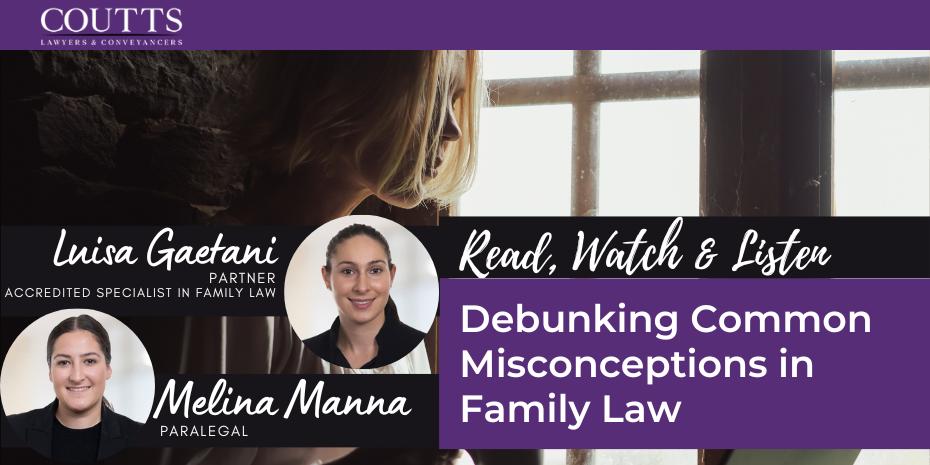KEY TAKE-OUTS
- What is a Binding Financial Agreement (BFA)?
- Legal Requirements for a BFA
- Advantages and Disadvantages of BFA’s
- What are Consent Orders?
- Advantages and Disadvantages of Consent Orders
When a marriage or de-facto relationship comes to an end in Australia there are two ways that are legally binding and recognised under the Family Law Act to settle your property and financial matters by agreement. Dealing with assets, liabilities, superannuation entitlements, financial resources and spousal maintenance matters effectively ends the financial relationship between the parties.
- Binding Financial Agreement
- Consent Orders
What is a Binding Financial Agreement (BFA)?
A BFA is in essence a contract between the parties effectively ending the financial relationship. It is drafted pursuant to the Family Law Act. A Binding Financial Agreement (BFA) sets out how all the assets of the relationship shall be divided. It does not need to be approved by a Court but must be drafted to specifications.
When entering a BFA because of the reasons the potential for coercion each party has to receive independent legal advice in relation to the agreement and the effects of the agreement and their entitlements under the Family Law Act.
Advantages of a BFA?
One reason parties may decide to use a BFA is that the parties can come to their own arrangements, and they do not need to meet the same criteria of the division of the assets and liabilities of the relationship being just and equitable. The requirement of a financial settlement being just and equitable in the circumstance is required under the Family Law Act by the Court when sealing consent orders.
The preparation and execution of a BFA can be much quicker than having to wait for the Consent Orders to be approved by the Court.
A BFA is not necessarily the most cost-effective way of finalising a property settlement by agreement due to both parties needing to separately obtain independent legal advice. With correspondence between firms regarding changes and amendments to the agreement, the prices can quickly and easily add up to more than the price of Consent Orders.
A BFA is also not restricted to the ending of a relationship one can be made before, during or at the breakdown of a marriage or de facto relationship.
Legal Requirements for a BFA
There are certain requirements that must be met for a BFA to be legally binding on both parties:
- The Agreement must be in writing and signed by both parties
- Each party must receive independent legal advice in regard to the agreement and their rights under the Family Law Act
- Each party must have a signed statement from their lawyer confirming they have received independent legal advice. These need to be exchanged between the parties.
- The agreement has not been overturned or set aside by the Court.
Disadvantages of a BFA
BFA’s are more readily overturned than Consent Orders. It is important to remember that relationships coming to an end can be very volatile and whilst things may be amicable at the time, they do not always remain that way.
The Family Court can overturn BFA’s in the following circumstances set out in the Family Law Act under s90KK and 90UM;
- The agreement was obtained by Fraud;
- Where not all material matter was disclosed to both parties;
- The agreement was used for illegitimate purposes such as to defraud a creditor or other party;
- Where the agreement has been drafted or executed wrongly, making the agreement unenforceable;
- One party engaged in unconscionable conduct;
- There is an issue with the superannuation split ass agreed;
- There has been a significant change in the circumstances of either party, such as a change relating to the care of a child where it would result in hardship for the child wrongly;
This is done by a party to the agreement applying directly to the Court to have the BFA set aside. Once the agreement has been set aside either party is able to apply to the Court and start the property/financial settlement process through the Court.
What are Consent Orders?
Consent Orders are orders made by agreement between the parties to a relationship either de-facto or married at the end of a relationship which are then sent to the Court for their approval under the Family Law Act s79 and s90SM respectively. These sections have the purpose of ending the financial relationship between the parties.
The Court will then review the Application which contains information about the parties’ financial circumstances throughout the relationship. A Registrar in Chambers must satisfy themselves that the Orders are just and equitable in all circumstances. Once approved the Orders are Sealed by the Court. This has the same effect as an Order made by the Court at the final hearing in other circumstances making it enforceable at law.
The review by the Registrar acts as an independent third party and a measure of security that one party is not being taken advantage of by the other. They compare the agreement with the likely outcome of any Family Law proceedings should the matter have proceeded to Court based on the material facts.
The Court has a four-step approach that it follows when determining property matters:
- Establish the property pool
- Contributions (financial/non-financial)
- Future needs of both parties
- age
- health
- financial resources
- dependants
- standard of living
- earning capacity
- The Just and equitable requirement (The practical effect of the Orders)
You can commence property settlement as soon as separation occurs. There is a time limit for commencing proceedings. 1 year of a divorce becoming “absolute” for married couples or 2 years after separation for de facto couples. There are ways around the time limit and exceptions.
Advantages of Consent Orders
- Consent Orders once sealed are legally binding Orders of the Court and as such are enforceable.
- Independent legal advice is not a requirement and one or both parties is able to act for themselves in the matter without legal advice.
- It is much harder for Consent Orders to be overturned than BFA’s.
- Consent Orders can deal with a range of issues including parenting matters.
- Full and frank financial disclosure is necessary.
Disadvantages of Consent Orders
- When completing the Application for Consent Orders a great deal of information in regard to the financial circumstances of each party and parenting arrangements must be provided.
- There is a filing fee to be paid to the Court (currently $170.00).
- The waiting time for Consent Orders can vary depending on the Court from 1 to 8 weeks.
- The Orders will only be approved if they fit the criteria above.
- Consent Orders do not finalise the spousal maintenance obligations of the parties.
- Full and frank financial disclosure is necessary.
When Can Consent Orders be overturned?
The circumstances on when they can be set aside are much more limited than BFA’s. These are set out in sections 79A and 90SN respectively.
- There has been a miscarriage of justice by reason of fraud, duress, suppression of evidence, the giving of false evidence or any other circumstance;
- It is impractical for the orders to be carried out;
- A party has defaulted and by way of that default it is just and equitable to vary the orders;
- circumstances of an exceptional nature relating to the care, welfare and development of a child of the relationship;
- Proceeds of crime order has been made;
What should I Choose?
There are benefits and disadvantages to both Binding Financial Agreements and Consent Orders. At Coutts we have the knowledge and education to be able to help you make an informed decision regarding finalising your property and financial settlement.
For further information please don’t hesitate to contact:
This blog is merely general and non-specific information on the subject matter and is not and should not be considered or relied on as legal advice. Coutts is not responsible for any cost, expense, loss or liability whatsoever to this blog, including all or any reliance on this blog or use or application of this blog by you.



